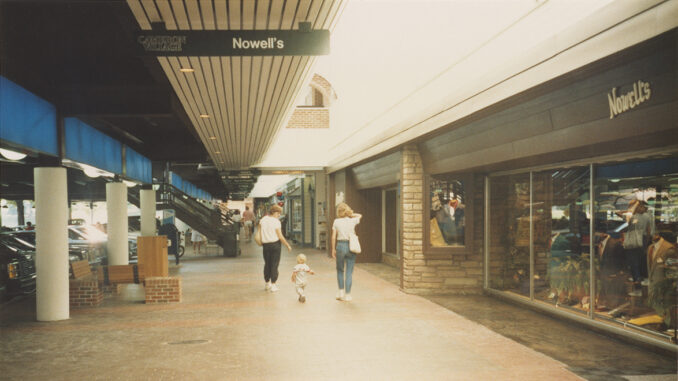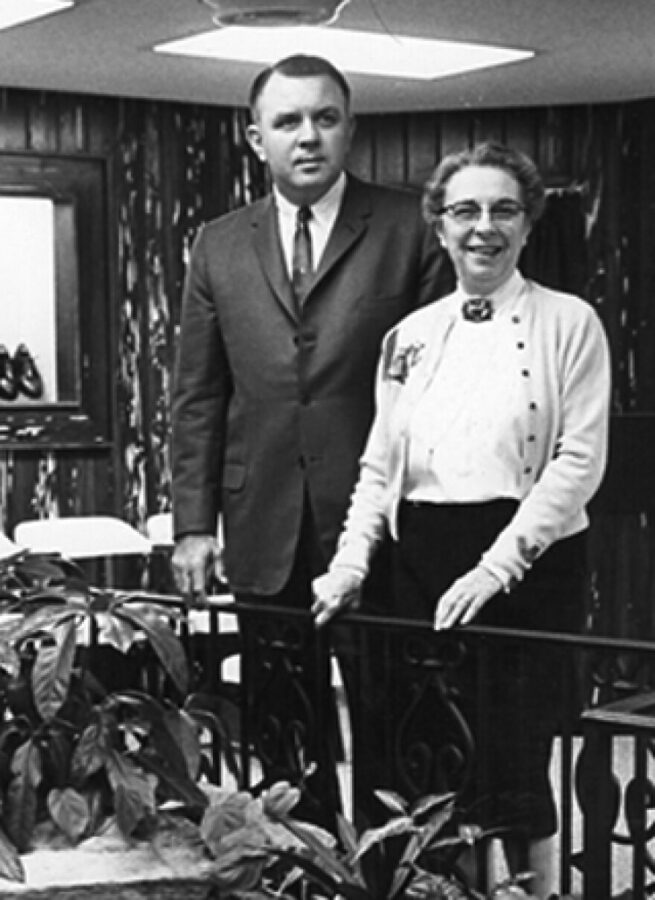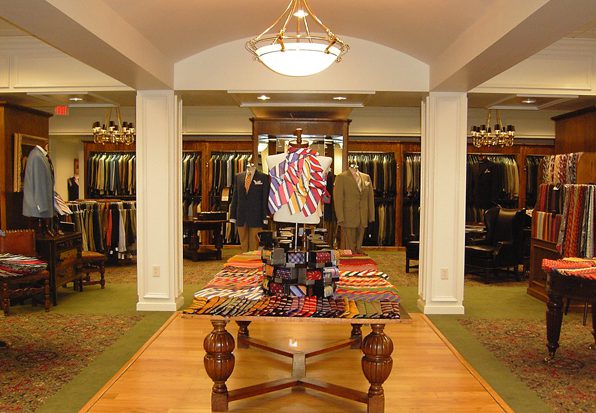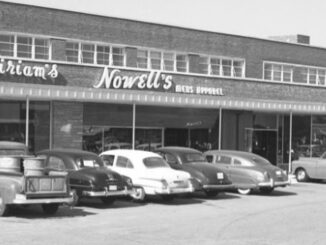
RALEIGH — After 103 years in business, the doors to Nowell’s last brick-and-mortar store on North Market Street in Raleigh are locked. The remaining houndstooth blazers, silk ties and shiny pairs of bit-loafers were sold or boxed up a few months ago. Schooner’s golf clubs are off the center display table, beloved dogs belonging to Lubet and the Nowell family chase squirrels elsewhere, and Matt is home with his adoring wife, Harriet.
Karen Nowell will continue the family tradition of clothing and apparel with Onward Reserve. Still, with a different outfit, but back at Cameron Village — now called the Village District — where for the bulk of the 20th century, Nowell’s Clothing stood as a cornerstone to the Triangle and North Carolina. It was more than just a store; it symbolized outstanding, welcoming customer service and premium products. It was where many young men got their first suits. Dignitaries and government leaders from both sides of the aisle were loyal customers, from CEOs of Fortune 500 companies and politicians Jesse Helms, Jim Hunt, Erskin Bowles and the North Carolina General Assembly to a teenage boy looking his best for senior prom, Nowell’s dressed Central and Eastern North Carolinians in style.
 As a Raleigh native, my childhood memories are intertwined with Nowell’s Clothing. The store’s back rooms and storage closets were my playgrounds, and the Nowell family, including Schooner Nowell’s daughter, were like an extended family to me. We were the “latchkey kids,” running amuck through heaps of fabric and occasionally driving the staff and customers mad. Little did I know then that the store where I played and the family I knew was a part of North Carolina’s rich history.
As a Raleigh native, my childhood memories are intertwined with Nowell’s Clothing. The store’s back rooms and storage closets were my playgrounds, and the Nowell family, including Schooner Nowell’s daughter, were like an extended family to me. We were the “latchkey kids,” running amuck through heaps of fabric and occasionally driving the staff and customers mad. Little did I know then that the store where I played and the family I knew was a part of North Carolina’s rich history.
Throughout modern times, men have dressed smartly. For the first half of the 20th century, a three-piece suit was standard issue for the working man. Posh occasions, even dinner, could call for tuxedos or tails. However, as culture and economics shifted, so did fashion. The end of WWI in 1918 marked the beginning of the “Roaring ’20s,” often referred to as the “Golden Age of Menswear.”
While paletot overcoats, Viennese style and cricket-spun suits were in vogue, not everyone dressed like characters from “The Great Gatsby.” Still, suits, ties, blazers, cuff links, fine footwear and other accouterments for the working and gallivanting man remained in demand. From the Roaring ’20s to the Great Depression through the COVID-19 pandemic, Nowell’s evolved at every turn and with every trend.
The family business began in 1921 when a young Arthur Nowell and his cousin opened Horton-Nowell Clothing Co. at Fayetteville and Martin streets in downtown Raleigh. Over time and with increased demand, in 1951, it found a permanent home at Cameron Village. The name changed to Nowell’s Clothing, relocating within the shopping center as it grew to a 20,000-plus-square-foot store before moving to North Market Street in 2003.
At one point, Nowell boasted several locations, including Chapel Hill, Fayetteville, the old North Hills Mall, a ladies’ shop and a men’s jeans store. Arthur’s son, Gwynn Nowell, ran the business until his death when the next generation — Gwynn “Schooner” Jr., Matt Hooper and daughter LuBet Nowell officially took the helm. But, as youngsters, the three cut their teeth in the world of haberdashery retail, finance and the value of exemplary customer service. The Nowell siblings matured into masters of the trade and successful leaders of the family enterprise until its closure in April.
“I started working there when I was 12, behind the cuff link and tie bar,” Matt Nowell said. “We all started at the store doing everything from running the postage machine to working the cash register, but as we got older, Schooner did the buying, Lubet handled buying ladies’ clothing, and I handled finances.”
Affectionately referred to by her family and all who knew her as “Granny,” Florence, Arthur’s wife, with little intention, became the de facto matriarch of the business. Initially, when she met Arthur, Florence was a nurse, and she began lending a helping hand at the store during the Depression. Her remarkable knack for coordinating men’s wardrobes soon earned her the reputation of a “legend in the business.” Customers gravitated to Granny for her sharp eye and enchanting disposition. For most of her life, Florence Nowell worked tirelessly, six to seven days a week, and even into her 80s.
Through the years, Nowell’s employed experts in tailoring and fashion, many of whom worked there for decades. They knew each customer not only by name but their kids’ names and, of course, their measurements and tastes. Matt Nowell fondly reminisces about “the consummate shoe salesman, EO Edgerton, who everybody adored; Barry Tharrington; and our tailor Sam, who came from Afghanistan and worked with us for 30 years.” It was a family-within-a-family business, which incidentally employed college students part-time during summers and holidays. There’s an old saying: “You can’t swing a dead cat in Raleigh without hitting someone who worked at Nowell’s part-time.” “They were in it for the 50% discount,” Nowell laughs.
Sideshow Bob once said, “Aah, for the days when aviation was a gentleman’s pursuit — back before every Joe Sweatsock could wedge himself behind a lunch tray and jet off to Raleigh-Durham.” As arrogant and elitist as that may sound, the pretentious, villainous Simpson’s character makes a convincing point: looking your best and dressing with a sense of occasion became secondary to comfort.
“Over time, button-downs and blazers soon replaced suits and ties, and when COVID-19 swept the globe, remote work changed the definition of ‘work attire,’” Nowell said. “Fifty percent of our business was sport coats, suits, dress shirts and ties, but everything’s casual now, and that was tougher.”

Not long after the move to North Market Street in 2003, Gwynn “Schooner” Nowell’s daughter Karen climbed aboard. She quickly became an invaluable asset to the Nowell’s Clothing enterprise, developing strategies in styles and the world of e-commerce by boosting their online presence and introducing high-end casual wear and contemporary accessories. Where once a display would feature only silver and gold cuff links, customers would find collegiate-branded belts and even cuff links adorned with Grateful Dead iconography. Brands like Bald Head Blues and Southern Tide filled the tables and racks alongside legacy labels Nowell’s had always offered.
But all good things must come to an end. Nowell’s Clothing fared well during and after the COVID-19 pandemic, but as Matt, Schooner and Lubet Nowell passed retirement age, a bittersweet reality sank in: It was time to call it quits. In April 2024, after 103 years in business, Nowell’s bid farewell to their loyal, loving customers and staff — “the heart and soul of our business.”
Nowell’s was an institution in North Carolina. As grateful as the family is for the customers who have supported the business for over a century, the outpouring of gratitude and fond memories of buying that first suit or of the lovable, dependable staff comes from the community. Those in Central and Eastern North Carolina will remember Nowell’s did for them, their parents and their grandparents for so long.

